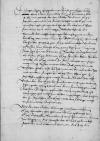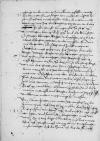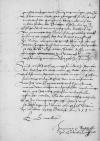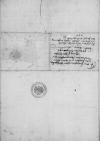Es ist beÿ mir gewest der probably Felix von Allen (Felix von Alden, Feliks Mełdzyński, Felix Stang, Felix von Malden) (†ca. 1576), Prussian nobleman in the service of Duke Albrecht von Hohenzollern; 1529, 1530, 1533, 1536, 1538 ducal envoy to King Sigismund I Jagiellon and, in 1537, to the Crown Diet at Piotrków; 1545-1551(?) Vice-Voivode of Kulm (Chełmno); 1551 alderman of Kulm; 1551-1575 Sword-Bearer of Kulm (SZYMANIAK 1992, p. 55-56; Urzędnicy 5/2, p. 221)⌊von Aldenprobably Felix von Allen (Felix von Alden, Feliks Mełdzyński, Felix Stang, Felix von Malden) (†ca. 1576), Prussian nobleman in the service of Duke Albrecht von Hohenzollern; 1529, 1530, 1533, 1536, 1538 ducal envoy to King Sigismund I Jagiellon and, in 1537, to the Crown Diet at Piotrków; 1545-1551(?) Vice-Voivode of Kulm (Chełmno); 1551 alderman of Kulm; 1551-1575 Sword-Bearer of Kulm (SZYMANIAK 1992, p. 55-56; Urzędnicy 5/2, p. 221)⌋ und mir E(wer) G(naden) cf. Albrecht I von Hohenzollern-Ansbach to Ioannes DANTISCUS Königsberg, 1532-10-15, CIDTC IDL 5154⌊schreibencf. Albrecht I von Hohenzollern-Ansbach to Ioannes DANTISCUS Königsberg, 1532-10-15, CIDTC IDL 5154⌋ geanntwurt, / durch welches mich E(wer) G(naden) mit wunschungen gluchs und hails an leib und seel frauntlich thut besuechen / uberschickhende die hanndl des negstvergangen Imperial Diet (Reichstag) ⌊reichstagImperial Diet (Reichstag) ⌋ mit andern, die E(wer) G(naden) von mir nam zu Riesenburg (Prabuty), town in northern Poland, Pomerania, 44 km NE of Graudenz⌊ResenburgRiesenburg (Prabuty), town in northern Poland, Pomerania, 44 km NE of Graudenz⌋ etc. Thue mich derhalben hochlich geen E(wer) G(naden) bedannckhen und wil geflissen sein, solliche E(wer) G(naden) gunstige zue naigung alle zeit zuverdiennen etc. Schickhe hir widerumb beÿ disem E(wer) G(naden) dienner / E(wer) G(naden) Dorothea of Denmark (*1520 – †1580), Electress Palatine; wife of Elector Palatine Friedrich II, daughter of Christian II of Oldenburg, King of Denmark and Norway and Isabella of Austria⌊furstinDorothea of Denmark (*1520 – †1580), Electress Palatine; wife of Elector Palatine Friedrich II, daughter of Christian II of Oldenburg, King of Denmark and Norway and Isabella of Austria⌋ klein khinder werckh. / Bit, E(wer) G(naden) wolts in freuntlicher, gunstiger meynung lassen antwurtten. / Ich wolt darmit verzogen haben, / biss das ich meinen brueder, / den ich mit andern dingen zu E(wer) G(naden) im khurtzen zu schickhen gesÿnt, / het mocht sennden. / So hab ich iczt verstanden, das E(wer) G(naden) der Dorothea of Denmark (*1520 – †1580), Electress Palatine; wife of Elector Palatine Friedrich II, daughter of Christian II of Oldenburg, King of Denmark and Norway and Isabella of Austria⌊furstinDorothea of Denmark (*1520 – †1580), Electress Palatine; wife of Elector Palatine Friedrich II, daughter of Christian II of Oldenburg, King of Denmark and Norway and Isabella of Austria⌋ von meinen untuchtigen geben gesagt. / Und wie dann fraulich gemuet, / als im buchern gefunden wirt, / unleidlich ist verzuges, / hett mich im besten angesechen, / das yetzunder zu schickhen. / Bit, E(wer) G(naden) wolt das selbige nicht unfreuntlich aufnemen. /
Was den probably Felix von Allen (Felix von Alden, Feliks Mełdzyński, Felix Stang, Felix von Malden) (†ca. 1576), Prussian nobleman in the service of Duke Albrecht von Hohenzollern; 1529, 1530, 1533, 1536, 1538 ducal envoy to King Sigismund I Jagiellon and, in 1537, to the Crown Diet at Piotrków; 1545-1551(?) Vice-Voivode of Kulm (Chełmno); 1551 alderman of Kulm; 1551-1575 Sword-Bearer of Kulm (SZYMANIAK 1992, p. 55-56; Urzędnicy 5/2, p. 221)⌊von Aldenprobably Felix von Allen (Felix von Alden, Feliks Mełdzyński, Felix Stang, Felix von Malden) (†ca. 1576), Prussian nobleman in the service of Duke Albrecht von Hohenzollern; 1529, 1530, 1533, 1536, 1538 ducal envoy to King Sigismund I Jagiellon and, in 1537, to the Crown Diet at Piotrków; 1545-1551(?) Vice-Voivode of Kulm (Chełmno); 1551 alderman of Kulm; 1551-1575 Sword-Bearer of Kulm (SZYMANIAK 1992, p. 55-56; Urzędnicy 5/2, p. 221)⌋[2] belanngt, wil ich mit khurtz E(weren) G(naden) berichten. / Her het mir brive gebracht von E(wer) G(naden) Georg von Polentz (*1478 – †1550), the first Protestant bishop of Samland; private secretary of pope Julius II; 1516 Komtur in Königsberg; 1518 bishop of Samland (also after the secularization of bishopric in 1525); 1521-1523 administrator of Pomesania bishopric (ADB, Bd. 26, p. 382-385; ORACKI 1988, p. 85-86)⌊bischoffen SamlanntGeorg von Polentz (*1478 – †1550), the first Protestant bishop of Samland; private secretary of pope Julius II; 1516 Komtur in Königsberg; 1518 bishop of Samland (also after the secularization of bishopric in 1525); 1521-1523 administrator of Pomesania bishopric (ADB, Bd. 26, p. 382-385; ORACKI 1988, p. 85-86)⌋ und Pomeran, / die mir irr sigel an das hochste des brives gedruckht schreiben und bittennd lernnen, / das ich die  GStA, PK, HBA, C 2, No 32, f. 1v gezeuge under meiner jurisdicion gesessen, welhe der probably Felix von Allen (Felix von Alden, Feliks Mełdzyński, Felix Stang, Felix von Malden) (†ca. 1576), Prussian nobleman in the service of Duke Albrecht von Hohenzollern; 1529, 1530, 1533, 1536, 1538 ducal envoy to King Sigismund I Jagiellon and, in 1537, to the Crown Diet at Piotrków; 1545-1551(?) Vice-Voivode of Kulm (Chełmno); 1551 alderman of Kulm; 1551-1575 Sword-Bearer of Kulm (SZYMANIAK 1992, p. 55-56; Urzędnicy 5/2, p. 221)⌊von Altenprobably Felix von Allen (Felix von Alden, Feliks Mełdzyński, Felix Stang, Felix von Malden) (†ca. 1576), Prussian nobleman in the service of Duke Albrecht von Hohenzollern; 1529, 1530, 1533, 1536, 1538 ducal envoy to King Sigismund I Jagiellon and, in 1537, to the Crown Diet at Piotrków; 1545-1551(?) Vice-Voivode of Kulm (Chełmno); 1551 alderman of Kulm; 1551-1575 Sword-Bearer of Kulm (SZYMANIAK 1992, p. 55-56; Urzędnicy 5/2, p. 221)⌋ seiner sachen vor meynet nutzlich zu sein, / suld vor mich lassen laden, / do neben mich belernet, / wie ich die rechtlich verhoren und beÿ penen in the Dantiscus's hand, superinscribed in place of crossed-out bei...⌈bei... illegible⌈...... illegible⌉ penen penen in the Dantiscus's hand, superinscribed in place of crossed-out bei...⌉ zu zeuchniss bringen sol. / So ist E(wer) G(naden) unverborgen, / das ich Clement VII (Giulio de' Medici) (*1478 – †1534), 1523-1534 Pope⌊bap(stliche)r hey(ligkei)st(en)Clement VII (Giulio de' Medici) (*1478 – †1534), 1523-1534 Pope⌋ und der Roman Catholic Church ⌊romischen cristlichen khirchenRoman Catholic Church ⌋ rechten und gesetzten, / wie die von alters biss hoer gehalten, / underworffen bin. / Wil mir derhalben / an roth und zuloss meyner oberkhait / nicht gezymen, das ich in frembde rechte, / welher richter unser khirchen gehorsam und eÿdenn sich enntzogen, / solde rechtliche gezeugnisse khomen lassen, / so doch sunst geistlich recht, / wie wir das halten, / von in ausgeslagen. Wie deme alles, / so wil ich dennoch in ubermoss zu meyner oberkhait mit den ersten in die Poland (Kingdom of Poland, Polonia)⌊Kron PolnPoland (Kingdom of Poland, Polonia)⌋ schreiben / und was mich die / disser sachen zu gut wirt lernnen / an verzug und gern thun. / Hierinne bit, E(wer) G(naden) wold khein besverung haben / und diss meiner notturfft und rechten, darinne ich gessessn, / und kheiner andern meynung zu messen. /
GStA, PK, HBA, C 2, No 32, f. 1v gezeuge under meiner jurisdicion gesessen, welhe der probably Felix von Allen (Felix von Alden, Feliks Mełdzyński, Felix Stang, Felix von Malden) (†ca. 1576), Prussian nobleman in the service of Duke Albrecht von Hohenzollern; 1529, 1530, 1533, 1536, 1538 ducal envoy to King Sigismund I Jagiellon and, in 1537, to the Crown Diet at Piotrków; 1545-1551(?) Vice-Voivode of Kulm (Chełmno); 1551 alderman of Kulm; 1551-1575 Sword-Bearer of Kulm (SZYMANIAK 1992, p. 55-56; Urzędnicy 5/2, p. 221)⌊von Altenprobably Felix von Allen (Felix von Alden, Feliks Mełdzyński, Felix Stang, Felix von Malden) (†ca. 1576), Prussian nobleman in the service of Duke Albrecht von Hohenzollern; 1529, 1530, 1533, 1536, 1538 ducal envoy to King Sigismund I Jagiellon and, in 1537, to the Crown Diet at Piotrków; 1545-1551(?) Vice-Voivode of Kulm (Chełmno); 1551 alderman of Kulm; 1551-1575 Sword-Bearer of Kulm (SZYMANIAK 1992, p. 55-56; Urzędnicy 5/2, p. 221)⌋ seiner sachen vor meynet nutzlich zu sein, / suld vor mich lassen laden, / do neben mich belernet, / wie ich die rechtlich verhoren und beÿ penen in the Dantiscus's hand, superinscribed in place of crossed-out bei...⌈bei... illegible⌈...... illegible⌉ penen penen in the Dantiscus's hand, superinscribed in place of crossed-out bei...⌉ zu zeuchniss bringen sol. / So ist E(wer) G(naden) unverborgen, / das ich Clement VII (Giulio de' Medici) (*1478 – †1534), 1523-1534 Pope⌊bap(stliche)r hey(ligkei)st(en)Clement VII (Giulio de' Medici) (*1478 – †1534), 1523-1534 Pope⌋ und der Roman Catholic Church ⌊romischen cristlichen khirchenRoman Catholic Church ⌋ rechten und gesetzten, / wie die von alters biss hoer gehalten, / underworffen bin. / Wil mir derhalben / an roth und zuloss meyner oberkhait / nicht gezymen, das ich in frembde rechte, / welher richter unser khirchen gehorsam und eÿdenn sich enntzogen, / solde rechtliche gezeugnisse khomen lassen, / so doch sunst geistlich recht, / wie wir das halten, / von in ausgeslagen. Wie deme alles, / so wil ich dennoch in ubermoss zu meyner oberkhait mit den ersten in die Poland (Kingdom of Poland, Polonia)⌊Kron PolnPoland (Kingdom of Poland, Polonia)⌋ schreiben / und was mich die / disser sachen zu gut wirt lernnen / an verzug und gern thun. / Hierinne bit, E(wer) G(naden) wold khein besverung haben / und diss meiner notturfft und rechten, darinne ich gessessn, / und kheiner andern meynung zu messen. /
Von newen zeitten, / wie woll ich waiss E(wer) G(naden) die zuvor habe, / lass ich E(wer) G(naden) wissen, das ich khurtzlich aus Passau (Batavia Bavariae), city in southern Germany, Bavaria, on the Danube river, 115 km SE of Regensburg⌊PassawPassau (Batavia Bavariae), city in southern Germany, Bavaria, on the Danube river, 115 km SE of Regensburg⌋ von Charles V of Habsburg (*1500 – †1558), ruler of the Burgundian territories (1506-1555), King of Spain as Charles I (1516-1556), King of Naples and Sicily, King of the Romans (1519-1530), Holy Roman Emperor of the German Nation (elected 1519, crowned 1530, abdicated 1556); son of Philip I the Handsome and Joanna the Mad of Castile⌊khay(serliche)r m(aieste)tCharles V of Habsburg (*1500 – †1558), ruler of the Burgundian territories (1506-1555), King of Spain as Charles I (1516-1556), King of Naples and Sicily, King of the Romans (1519-1530), Holy Roman Emperor of the German Nation (elected 1519, crowned 1530, abdicated 1556); son of Philip I the Handsome and Joanna the Mad of Castile⌋ und auss i(re)r m(aieste)t hoff von hern und freunden, / dergleichen auch von Vienna (Wien, Vienna), city in eastern Austria, on the Danube river⌊WienVienna (Wien, Vienna), city in eastern Austria, on the Danube river⌋ den 3 tag ditzs monts, / do auf das mals khay(serlich)e m(aieste)t gewest, / nicht wenig brive enntphangen, aus welhen diss die s(um)ma ist, das der The Ottoman Turks (Turcae) ⌊TurckhThe Ottoman Turks (Turcae) ⌋ /  GStA, PK, HBA, C 2, No 32, f. 2r gewislich verzogen und Güns (Köszeg, Guncium), town and fortress in northwestern Hungary on the border with Austria⌊GuntzGüns (Köszeg, Guncium), town and fortress in northwestern Hungary on the border with Austria⌋ ungewungen gelassen und das mein lieber herr Friedrich II of Wittelsbach der Weise (*1482 – †1556), Count Palatine of the Rhine, Elector of Pfalz (1544-1556); in 1529 and 1532 the Commander in Chief of the imperial army; son of Philipp der Aufrichtige, Elector Palatine of the Rhine (NDB, Bd. 5, p. 528-530)⌊pfaltzgraff FridrichFriedrich II of Wittelsbach der Weise (*1482 – †1556), Count Palatine of the Rhine, Elector of Pfalz (1544-1556); in 1529 and 1532 the Commander in Chief of the imperial army; son of Philipp der Aufrichtige, Elector Palatine of the Rhine (NDB, Bd. 5, p. 528-530)⌋ auf einer / und der hauptman Hans Katzianer (*1490 – †1539)⌊KhatzianderHans Katzianer (*1490 – †1539)⌋ auf der andern seiden / den The Ottoman Turks (Turcae) ⌊TurckhenThe Ottoman Turks (Turcae) ⌋ biss in die XII-M erslagen / und wie mir geschriben, / das Charles V of Habsburg (*1500 – †1558), ruler of the Burgundian territories (1506-1555), King of Spain as Charles I (1516-1556), King of Naples and Sicily, King of the Romans (1519-1530), Holy Roman Emperor of the German Nation (elected 1519, crowned 1530, abdicated 1556); son of Philip I the Handsome and Joanna the Mad of Castile⌊khay(serliche) m(aieste)tCharles V of Habsburg (*1500 – †1558), ruler of the Burgundian territories (1506-1555), King of Spain as Charles I (1516-1556), King of Naples and Sicily, King of the Romans (1519-1530), Holy Roman Emperor of the German Nation (elected 1519, crowned 1530, abdicated 1556); son of Philip I the Handsome and Joanna the Mad of Castile⌋ von manicherlay nacion so ein geweldig volckh zusame het gehabt, / des das drittal eine slacht zu livern wer genueg gewest. / Charles V of Habsburg (*1500 – †1558), ruler of the Burgundian territories (1506-1555), King of Spain as Charles I (1516-1556), King of Naples and Sicily, King of the Romans (1519-1530), Holy Roman Emperor of the German Nation (elected 1519, crowned 1530, abdicated 1556); son of Philip I the Handsome and Joanna the Mad of Castile⌊Khay(serliche) m(aieste)tCharles V of Habsburg (*1500 – †1558), ruler of the Burgundian territories (1506-1555), King of Spain as Charles I (1516-1556), King of Naples and Sicily, King of the Romans (1519-1530), Holy Roman Emperor of the German Nation (elected 1519, crowned 1530, abdicated 1556); son of Philip I the Handsome and Joanna the Mad of Castile⌋ sol nach Italy (Italia)⌊ItalienItaly (Italia)⌋ ziechen und das merer thail das volckhs ist beÿ Ferdinand I of Habsburg (*1503 – †1564), from 1521 Archduke of Austria, from 1526 King of Bohemia and Hungary, Croatia and Slavonia as Ferdinand I, 1531-1558 King of the Romans, 1558-1564 Holy Roman Emperor; son of Philip I the Handsome and Joanna the Mad of Castile, a younger brother of Charles V of Habsburg⌊ro(mische)r ko(nigliche)r m(aieste)tFerdinand I of Habsburg (*1503 – †1564), from 1521 Archduke of Austria, from 1526 King of Bohemia and Hungary, Croatia and Slavonia as Ferdinand I, 1531-1558 King of the Romans, 1558-1564 Holy Roman Emperor; son of Philip I the Handsome and Joanna the Mad of Castile, a younger brother of Charles V of Habsburg⌋ bliben. / Sollen dissen wintter Hungary (Kingdom of Hungary)⌊HungernHungary (Kingdom of Hungary)⌋ einnemen und villeicht k[...] paper damaged⌈[...][...] paper damaged⌉[3] probably Gyulafehérvár (Alba Iulia, Weißenburg, Bălgrad), city in Transylvania, today in Romania⌊Weissenburgprobably Gyulafehérvár (Alba Iulia, Weißenburg, Bălgrad), city in Transylvania, today in Romania⌋ einnemen. Got gebe in [...] paper damaged⌈[...][...] paper damaged⌉[4]
GStA, PK, HBA, C 2, No 32, f. 2r gewislich verzogen und Güns (Köszeg, Guncium), town and fortress in northwestern Hungary on the border with Austria⌊GuntzGüns (Köszeg, Guncium), town and fortress in northwestern Hungary on the border with Austria⌋ ungewungen gelassen und das mein lieber herr Friedrich II of Wittelsbach der Weise (*1482 – †1556), Count Palatine of the Rhine, Elector of Pfalz (1544-1556); in 1529 and 1532 the Commander in Chief of the imperial army; son of Philipp der Aufrichtige, Elector Palatine of the Rhine (NDB, Bd. 5, p. 528-530)⌊pfaltzgraff FridrichFriedrich II of Wittelsbach der Weise (*1482 – †1556), Count Palatine of the Rhine, Elector of Pfalz (1544-1556); in 1529 and 1532 the Commander in Chief of the imperial army; son of Philipp der Aufrichtige, Elector Palatine of the Rhine (NDB, Bd. 5, p. 528-530)⌋ auf einer / und der hauptman Hans Katzianer (*1490 – †1539)⌊KhatzianderHans Katzianer (*1490 – †1539)⌋ auf der andern seiden / den The Ottoman Turks (Turcae) ⌊TurckhenThe Ottoman Turks (Turcae) ⌋ biss in die XII-M erslagen / und wie mir geschriben, / das Charles V of Habsburg (*1500 – †1558), ruler of the Burgundian territories (1506-1555), King of Spain as Charles I (1516-1556), King of Naples and Sicily, King of the Romans (1519-1530), Holy Roman Emperor of the German Nation (elected 1519, crowned 1530, abdicated 1556); son of Philip I the Handsome and Joanna the Mad of Castile⌊khay(serliche) m(aieste)tCharles V of Habsburg (*1500 – †1558), ruler of the Burgundian territories (1506-1555), King of Spain as Charles I (1516-1556), King of Naples and Sicily, King of the Romans (1519-1530), Holy Roman Emperor of the German Nation (elected 1519, crowned 1530, abdicated 1556); son of Philip I the Handsome and Joanna the Mad of Castile⌋ von manicherlay nacion so ein geweldig volckh zusame het gehabt, / des das drittal eine slacht zu livern wer genueg gewest. / Charles V of Habsburg (*1500 – †1558), ruler of the Burgundian territories (1506-1555), King of Spain as Charles I (1516-1556), King of Naples and Sicily, King of the Romans (1519-1530), Holy Roman Emperor of the German Nation (elected 1519, crowned 1530, abdicated 1556); son of Philip I the Handsome and Joanna the Mad of Castile⌊Khay(serliche) m(aieste)tCharles V of Habsburg (*1500 – †1558), ruler of the Burgundian territories (1506-1555), King of Spain as Charles I (1516-1556), King of Naples and Sicily, King of the Romans (1519-1530), Holy Roman Emperor of the German Nation (elected 1519, crowned 1530, abdicated 1556); son of Philip I the Handsome and Joanna the Mad of Castile⌋ sol nach Italy (Italia)⌊ItalienItaly (Italia)⌋ ziechen und das merer thail das volckhs ist beÿ Ferdinand I of Habsburg (*1503 – †1564), from 1521 Archduke of Austria, from 1526 King of Bohemia and Hungary, Croatia and Slavonia as Ferdinand I, 1531-1558 King of the Romans, 1558-1564 Holy Roman Emperor; son of Philip I the Handsome and Joanna the Mad of Castile, a younger brother of Charles V of Habsburg⌊ro(mische)r ko(nigliche)r m(aieste)tFerdinand I of Habsburg (*1503 – †1564), from 1521 Archduke of Austria, from 1526 King of Bohemia and Hungary, Croatia and Slavonia as Ferdinand I, 1531-1558 King of the Romans, 1558-1564 Holy Roman Emperor; son of Philip I the Handsome and Joanna the Mad of Castile, a younger brother of Charles V of Habsburg⌋ bliben. / Sollen dissen wintter Hungary (Kingdom of Hungary)⌊HungernHungary (Kingdom of Hungary)⌋ einnemen und villeicht k[...] paper damaged⌈[...][...] paper damaged⌉[3] probably Gyulafehérvár (Alba Iulia, Weißenburg, Bălgrad), city in Transylvania, today in Romania⌊Weissenburgprobably Gyulafehérvár (Alba Iulia, Weißenburg, Bălgrad), city in Transylvania, today in Romania⌋ einnemen. Got gebe in [...] paper damaged⌈[...][...] paper damaged⌉[4]
Sunst waiss ich E(weren) G(naden) nicht sunders zu schreiben, dan das ich bit, wolt mein g(nediger), lieber herr sein und diss mein schreiben, guetter maÿnung gethan, / freuntlich und guttiglich von mir aufnemen. Wer ich wor E(weren) G(naden) vil liebs und diennste nach meinen vermuegen und profession werd muegn thun, / wil ich alles gehorsam und geflissen gefunden werden. / Got der almechtig enthalde E(wer) G(naden) in lanngweriger gesunthait und gluckhsaligen zu nemen longe zeit.
 GStA, PK, HBA, C 2, No 32, f. 2v
GStA, PK, HBA, C 2, No 32, f. 2v  GStA, PK, HBA, C 2, No 32, f. 1r
GStA, PK, HBA, C 2, No 32, f. 1r  GStA, PK, HBA, C 2, No 32, f. 1v gezeuge under meiner jurisdicion gesessen, welhe der probably
GStA, PK, HBA, C 2, No 32, f. 1v gezeuge under meiner jurisdicion gesessen, welhe der probably  GStA, PK, HBA, C 2, No 32, f. 2r gewislich verzogen und
GStA, PK, HBA, C 2, No 32, f. 2r gewislich verzogen und 


